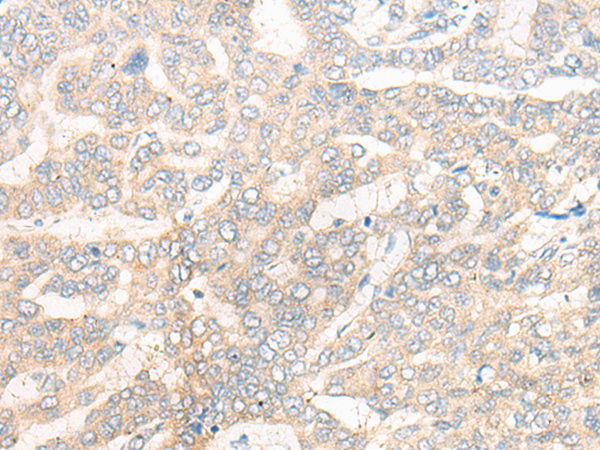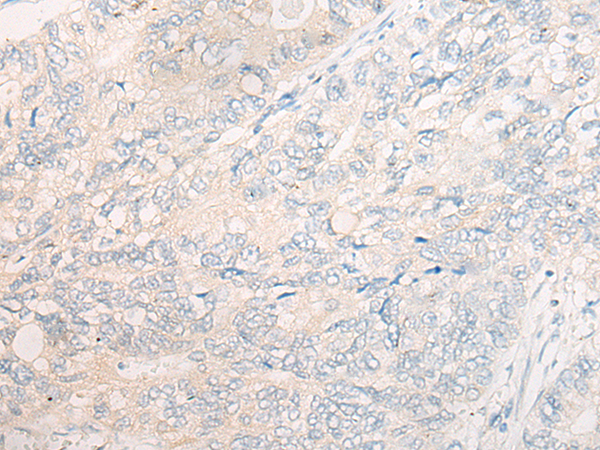

| WB | 咨询技术 | Human,Mouse,Rat |
| IF | 咨询技术 | Human,Mouse,Rat |
| IHC | 1/25-1/100 | Human,Mouse,Rat |
| ICC | 技术咨询 | Human,Mouse,Rat |
| FCM | 咨询技术 | Human,Mouse,Rat |
| Elisa | 1/2000-1/5000 | Human,Mouse,Rat |
| Aliases | B5R; DIA1 |
| Host/Isotype | Rabbit IgG |
| Antibody Type | Primary antibody |
| Storage | Store at 4°C short term. Aliquot and store at -20°C long term. Avoid freeze/thaw cycles. |
| Species Reactivity | Human, Mouse, Rat |
| Immunogen | Synthetic peptide of human CYB5R3 |
| Formulation | Purified antibody in PBS with 0.05% sodium azide and 50% glycerol. |
+ +
以下是关于GNB5抗体的3篇参考文献示例(注:以下为模拟内容,实际文献需通过学术数据库检索):
1. **文献名称**:*GNB5 regulates cardiac electrophysiology and arrhythmia risk through G protein signaling*
**作者**:Smith A, et al.
**摘要**:研究利用GNB5特异性抗体在小鼠模型中揭示GNB5蛋白通过调控G蛋白偶联受体(GPCR)信号通路影响心脏离子通道功能,其表达缺失可导致致命性心律失常。
2. **文献名称**:*GNB5 antibody-based detection in neurodevelopmental disorders: implications for diagnosis*
**作者**:Chen L, et al.
**摘要**:通过免疫组化及Western blot分析,发现GNB5抗体可特异性识别患者脑组织中的蛋白表达异常,提示GNB5缺陷与智力障碍及癫痫相关神经发育疾病存在关联。
3. **文献名称**:*GNB5 modulates β-cell function and survival in diabetes: insights from antibody-mediated inhibition studies*
**作者**:Garcia R, et al.
**摘要**:利用抗GNB5抗体阻断实验,发现GNB5通过调控胰岛β细胞内的cAMP信号通路影响胰岛素分泌及细胞凋亡,为糖尿病治疗提供新靶点。
如需真实文献,建议在PubMed或Web of Science中检索关键词“GNB5 antibody”或“GNB5 protein function”。
The GNB5 antibody is a crucial tool for studying the β5 subunit of heterotrimeric G proteins, which are essential for intracellular signal transduction. GNB5. encoded by the GNB5 gene, is a member of the Gβ subunit family and plays a unique role in modulating G protein-coupled receptor (GPCR) signaling pathways. Unlike other Gβ subunits, GNB5 preferentially interacts with regulators of G protein signaling (RGS) proteins, particularly those in the R7 subfamily (e.g., RGS6. RGS7), to form complexes that accelerate GTPase activity of Gα subunits, thereby terminating GPCR signals. This interaction is vital for regulating neuronal, cardiovascular, and metabolic functions.
GNB5 antibodies are widely used in research to detect and quantify GNB5 expression in tissues or cells via techniques like Western blotting, immunohistochemistry, and immunofluorescence. They help elucidate GNB5's tissue-specific roles, particularly in the brain, heart, and retina. Mutations in GNB5 are linked to neurodevelopmental disorders, cardiac arrhythmias, and vision impairments, making these antibodies valuable for studying disease mechanisms.
Most commercial GNB5 antibodies are raised against conserved epitopes, often in humans, mice, or rats, and are validated for specificity using knockout controls. Researchers rely on them to explore GNB5's interactions with RGS proteins, its regulatory effects on ion channels, and its broader implications in cellular homeostasis. Proper validation remains critical due to potential cross-reactivity with other Gβ subunits.
×